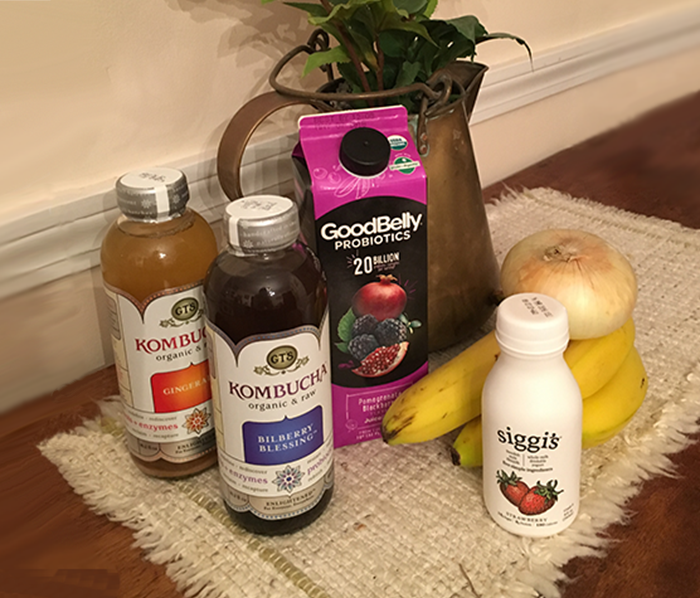Did you know that 80% percent of your immune system resides in your intestines (AKA your “gut”) and that there are 20 times more bacteria living in your gut than all the other cells in the rest of your body?
Did you also know that just any “old bacteria” won’t do?
It is vital to your health to have the ‘right’ bacteria to support healthy digestion, produce vitamins, and create a strong immune system. Eating refined carbohydrates, especially sugar, weakens your immune system.
If you are someone who has used antibiotics, read on. This also applies to you. Antibiotics destroy healthy and unhealthy bacteria and put gut flora in a state of disarray.
PROBIOTICS CAN HELP
Probiotic foods are one way to help offset exposure to low dose antibiotics, such as from grain-fed animal feed and antibiotics that end up in our rivers and water supply. Probiotics may sound confusing, but they are basically foods that promote a healthy gut environment. Probiotics are known to stimulate Vitamin B synthesis, improve digestion, increase resistance to infection, relieve symptoms of diarrhea, and promote the absorption of minerals, such as calcium and magnesium. The elderly may benefit even more from probiotic foods, as the amount of colonic bacteria decreases with age.

Probiotic product food labels list the number of microbes they contain, referred to as colony-forming units (CFUs). One serving of yogurt can contain billions of these microbes. The microbes are heat-sensitive and can be found in yogurts in the refrigerated section of the grocery store.
Look for products with 6 to 10 billion CFUs such as YoPlus (with 1 billion CFUs), Activia yogurt (with 10 billion CFUs), DanActive (with10 billion CFUs), or Good Belly (with 20 billion CFUs).
Probiotics are also available in supplement form. Enteric-coated probiotic supplements dissolve mainly in the gut, but the powder can also be put into 4 ounces of a cold beverage, which distributes the probiotic bacteria along the GI tract.
Probiotics depend on plant-based “prebiotics” for fuel, such as bananas, onions, garlic, leeks, shallots, Jerusalem and globe artichokes, chicory root, and yacon. Other “potential” prebiotic foods are apples, asparagus, peas, beans, lentils, chickpeas, whole wheat, barley, and rye. Prebiotics foods are harder for “less healthy” bacteria to digest, so they give the advantage to healthy bacteria to prosper.
FOOD SUGGESTIONS
Below are some food suggestions for probiotic and fermented foods:
- Choose yogurts that are grass fed, organic and plain, without added sugar. Make sure live cultures were added after pasteurization, as heat kills live cultures.
- Non-dairy yogurts may be easier to digest. Add nuts and seeds if low in protein but, again, check the sugar content.
- Cottage and aged cheeses and yogurt help bacteria “adhere to the intestinal wall”.
- Kefir contains at least 10 strains of live bacteria and is great in smoothies.
- Sauerkraut is known to decrease IBS symptoms.
- Kombucha contains 2% alcohol and is made from sugar in teas.
- Kimchi, a Japanese food, is good for intestinal disorders.
- Kvass is a fermented beverage made from rye bread.
- Fermented coffee, such as Afineur, may decrease the “heartburn” effect.
- Miso is very salty. Use sparingly with cool foods.
- Be sure that probiotic cereals and bars state that their live cultures are viable to end of their shelf life. Attune Bars are great for travel! Their cultures are good for 2 to 3 weeks if kept at or below normal room temperatures.
Here are some other gut-healthy food choices:
- Apple cider vinegar makes hydrochloric acid, which aids in digestion and helps relieve acid reflux.
- Mangoes help regulate blood sugar and contain many nutrients.
- Sprouted grains are easier to digest and increase nutrient absorption.
- Probiotic chocolate is available from Sakara Life. It has 10 billion units of healthy bacteria plus yakon root.
- Bone broth is one of the most nutrient dense foods on the planet.
- High fiber foods help relieve constipation, hemorrhoids, and digestive disorders.
Resources:
Colbin, Annemarie. Food and Healing, Ballentine Press, New York.
Hattner, Jo Ann and Anderes, Susan. Gut Insight: probiotics and prebiotics for digestive health. 2009.
Huffnagle, Gary B. The Probiotics Revolution. Bantam Book, New York. 2008.
“20 Best Foods for a Healthy Gut” by Sharon Feiereisen, http://eatthis.com/foods-gut-health
